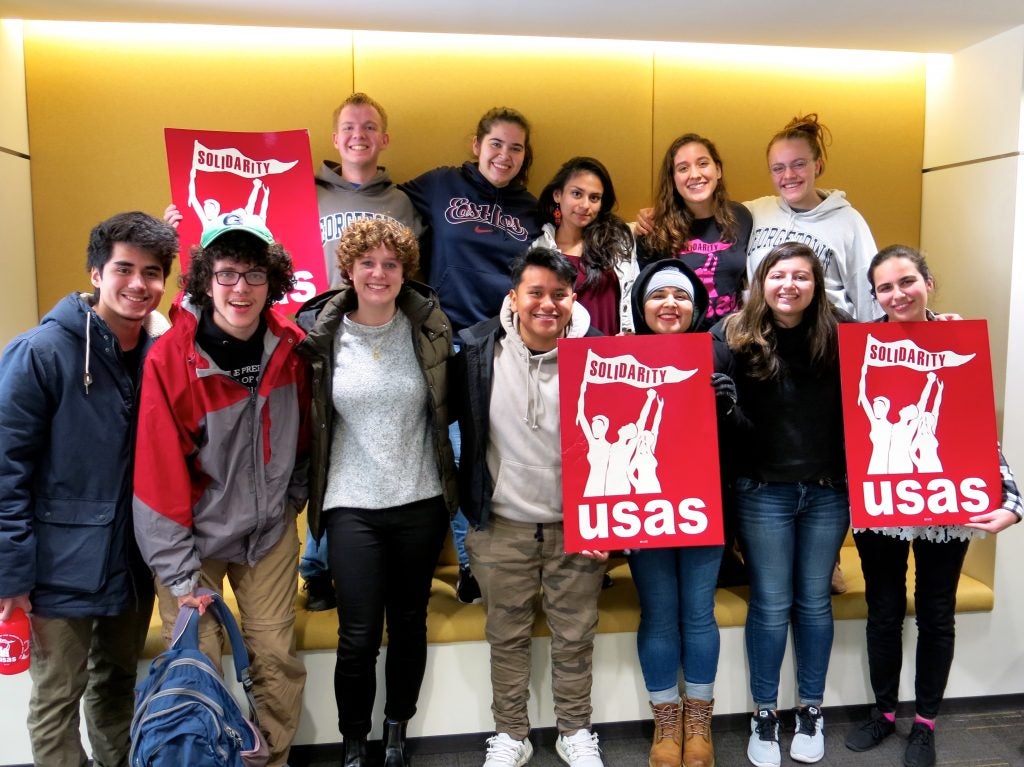BLOG: What Does Being a Student in DC Have to Do with Global Labor Standards?

Posted in Student Leaders Worker Justice DC | Tagged Alternative Break Program, Blog, Jess Chilin, Jessica Richards, Reflection, students, WJDC, Worker Justice DC
Jessica E. Richards (COL ’20) is a participant in the KI’s 2018 Worker Justice DC alternative break program.
At the end of every day during the week, our trip leaders asked us to sit down and think about what we had experienced that day. What were some moments that stood out to you? What do you want to remember from today? Make sure to write that down, so you can keep it with you, they would say. Looking back at the week in its entirety, there are too many impactful moments to list. What stands out even more than these moments, however, are the new lenses I learned to look at things through, and the connections I made not only with the other members of our team, but between issues I have heard a lot about and the people who are actually living their effects in my own community, D.C.
Often times, learning the details of how the power in international markets is distributed feels like walking down dead-end roads that all end exactly the same way. While I know it’s important to learn about particular injustices that an international capitalist market breeds, conversations usually seem to center around an unstated question: “Is this system working?” And when working would mean fostering an equitable society with equal opportunity for all, the answer is unsurprisingly and overwhelmingly no. The discussions we had as a team over Worker Justice DC, however, pushed us to ask better, deeper questions. We practiced analysing systems in place not only by asking why they aren’t working, but by taking it a step further. If this system is clearly not working (to achieve its stated goals), what is continuing to fuel it? In whose interest is it for this system to continue to operate unchanged, while entire groups of people are suffering under it? Or in other words, who is benefitting from this? Asking this question allows us to move beyond an analysis that points out the problem — to one that catalyses us into effective direct action strategies.
If we know, for example, that the workers who sewed our Georgetown sweatshirts are being underpaid and forced to work in unsafe conditions for more than eight hours a day, thinking about why the laws that are in place are not actually empowering these workers can bring about an exhausting hopelessness. What talking through these issues with United Students Against Sweatshops and various other solidarity organisations reminded me, however, is to ask who is benefitting from these processes. Actors who are benefitting from these interactions usually hold the power to change them, if they are incentivised to. And that is where student power comes in. The commoditisation of the university education has socialised students to see ourselves mainly as consumers receiving a service, as opposed to agents in a community. As students, we are not powerless unless we decide to give up that power and allow institutions to make decisions on our behalf. As both students and consumers, we can hold institutions that claim to represent our interests accountable until they actually do. And until that day, the fight will continue.
While being able to visit and hear from organisations all across the spectrum working for labour rights in DC was undeniably an experience that I will take with me moving forward, these questions WJDC allowed me to ask have already snuck their way into other areas of my life. In my work with Free Minds Book Club and Writing Workshop, a movement working to empower currently and formerly incarcerated people through literature, I have been able to make connections I did not see before. The Federal Bureau of Prisons is constantly instating policies and bureaucratic obstacles that make it more difficult for incarcerated folks to get books. I did not want to believe that there were really that many people out there whose sole aim it was to stop someone who was incarcerated from being able to educate themselves. It did not make sense to me.
What my reflections on my WJDC experience have allowed me to see with more confidence is who needs to be held accountable in this situation. Even if no individual person wants to restrict people’s access to education, if prisons are for profit, companies make more money the longer people are incarcerated. We know that when people have access to education, they spend less time in prison and are less likely to be rearrested. This means less money for the company that is keeping them incarcerated. In this case, private prisons are benefitting from restricting access to books for prisoners.
Each night our leaders asked What do you want to remember from this week? Well, I believe I have the beginnings of an answer. I want to remember the vulnerability this team encouraged, that allowed me to be honest with what I didn’t understand. I want to remember the people that helped me ask new questions and see new answers.
